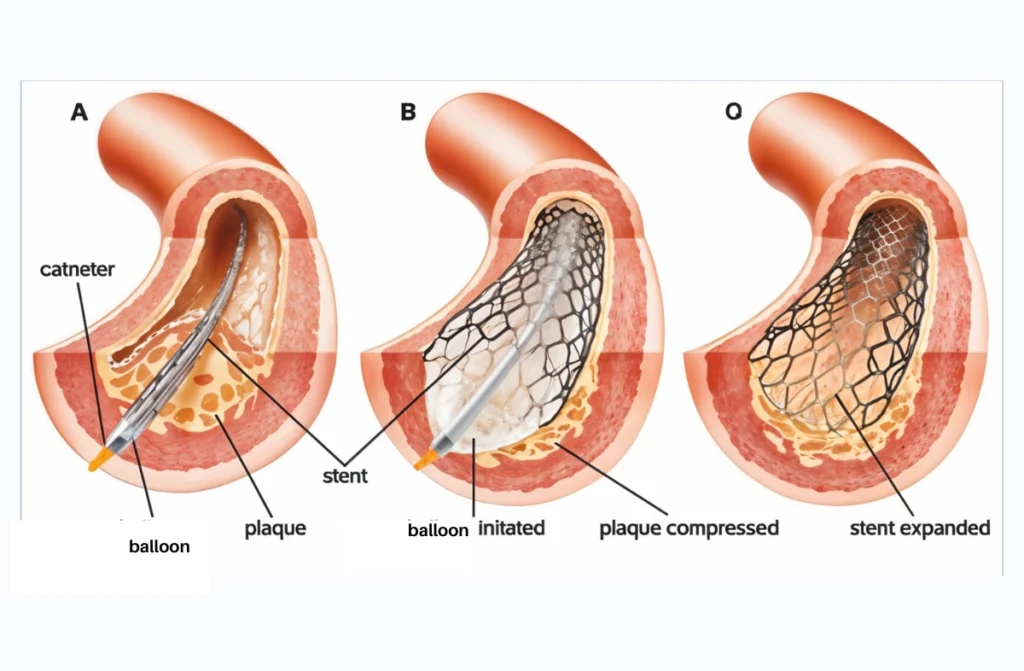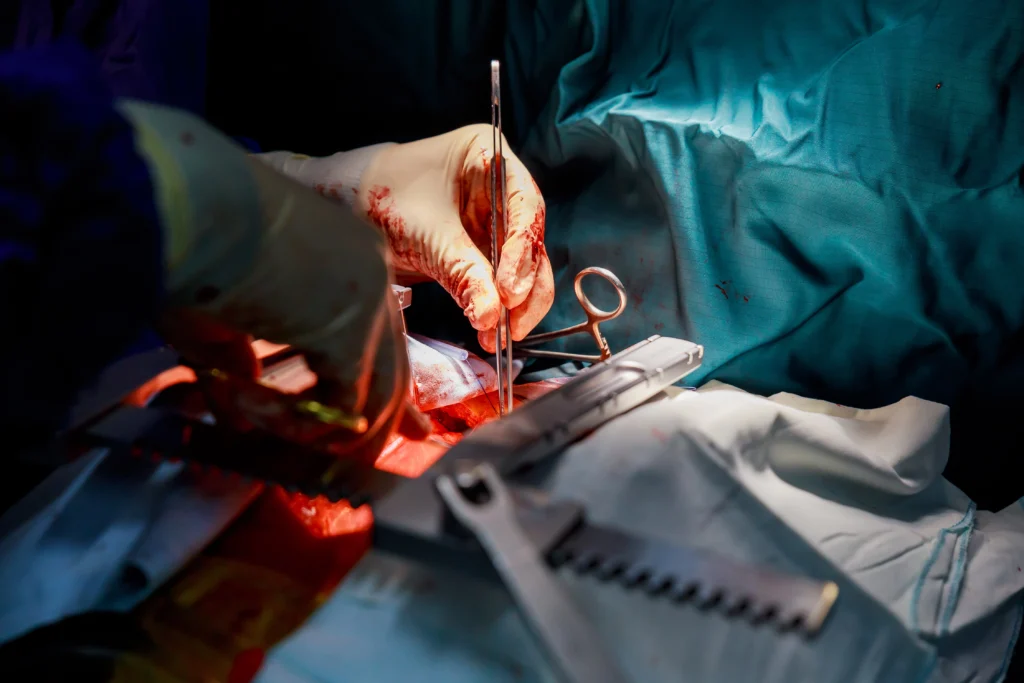All over the world, the most common and problematic heart disease at present is coronary artery disease which means blockages developing in the blood vessels of the heart. We all have three blood vessels that supply blood and nutrients to the heart muscle continuously so that the heart can perform its function efficiently. If there is an issue, it is recommended to get the complex and advanced angioplasty in Chennai to lead a healthy lifestyle.
Evolution of Angioplasty
Early Developments in Angioplasty
- The journey of angioplasty began several decades ago when it was first introduced as a less invasive alternative to coronary artery bypass surgery. Initially, angioplasty involved the use of a simple balloon to open up clogged arteries. However, as coronary artery diseases became more complex, the need for advanced techniques and tools became evident. This evolution has led to the development of complex and advanced angioplasty in Chennai, where state-of-the-art methods are now employed to treat patients.
Advanced Angioplasty Techniques
- Advanced Angioplasty refers to the use of sophisticated procedures and devices to treat intricate coronary artery blockages. In Chennai, these advanced techniques include the use of drug-eluting stents, atherectomy, and rotational atherectomy, among others. These methods ensure that even the most challenging cases can be managed effectively, providing patients with a better quality of life.
Role of Angioplasty Specialists in Chennai
- Angioplasty Specialists in Chennai are highly trained professionals who possess the expertise and experience to handle complex coronary cases. These specialists are adept at performing intricate procedures that require precision and skill. Their role is crucial in ensuring successful outcomes for patients undergoing complex and advanced angioplasty in Chennai.
Advanced Angioplasty Techniques
Drug-Eluting Stents
- Drug-eluting stents are one of the most significant advancements in angioplasty. These stents are coated with medication that helps prevent the re-narrowing of the arteries after the procedure. The use of drug-eluting stents in complex and advanced angioplasty in Chennai has greatly improved the long-term success rates of the procedure, reducing the need for repeat interventions.
Rotational Atherectomy
- Rotational atherectomy is a specialized technique used in advanced angioplasty to remove calcified plaques from the coronary arteries. This procedure involves the use of a high-speed rotational device that grinds away the hard plaque, allowing the artery to be widened more effectively. This method is particularly beneficial for patients with heavily calcified arteries that cannot be treated with conventional balloon angioplasty.
Intravascular Ultrasound (IVUS)
- Intravascular ultrasound (IVUS) is an imaging technique used during complex coronary angioplasty to provide a detailed view of the inside of the arteries. This technology helps angioplasty specialists in Chennai to accurately assess the extent of the blockage and guide the placement of stents and other devices. IVUS has become an essential tool in the armamentarium of complex and advanced angioplasty in Chennai.
Fractional Flow Reserve (FFR)
- Fractional flow reserve (FFR) is an advanced method used to evaluate the pressure differences across a narrowed segment of a coronary artery. This method helps determine the functional significance of the blockage, guiding the decision-making process during angioplasty. The use of FFR in complex and advanced angioplasty in Chennai ensures that only the most necessary interventions are performed, minimizing the risk to the patient.

Coronary Artery Disease and Risk Factors
- Smoking: Damages artery walls, leading to plaque buildup and increasing heart disease risk.
- High Blood Pressure: Strains the heart, causing arteries to thicken or narrow.
- High Cholesterol: Leads to plaque deposits in arteries, blocking blood flow.
- Diabetes: Excess blood sugar damages blood vessels, raising heart disease risk.
- Obesity: Increases strain on the heart and worsens blood pressure, cholesterol, and blood sugar levels.
- Sedentary Lifestyle: Lack of physical activity raises the risk of artery-clogging.
- Family History: Genetics can increase vulnerability to heart disease.
- Age and Gender: Men and older adults have higher risks.
Each of these factors contributes to the progression of coronary artery disease and impacts heart health.
Disease Progression and Symptoms
- Early Stage: Often asymptomatic; mild plaque buildup may not restrict blood flow.
- Mild Symptoms: Fatigue, shortness of breath, especially during physical activity.
- Stable Angina: Chest pain or discomfort during exertion, relieved by rest.
- Unstable Angina: Sudden chest pain at rest or with minimal exertion; indicates worsening blockage.
- Progressive Plaque Accumulation: Artery narrowing limits oxygen-rich blood to the heart.
- Heart Attack: Complete blockage causes severe chest pain, sweating, nausea, and shortness of breath.
- Advanced Symptoms: Irregular heartbeat, lightheadedness, and pain in arms, neck, or back.
- Heart Failure: Chronic progression may weaken the heart, leading to poor blood circulation.
Importance of Early Diagnosis and Prevention
- Prevents Disease Progression: Early detection helps control risk factors, slowing disease advancement.
- Reduces Complications: Timely intervention lowers the chances of severe outcomes like heart attack or stroke.
- Enhances Treatment Effectiveness: Early-stage treatments are often more successful and less invasive.
- Lowers Healthcare Costs: Preventive care and early treatment reduce the need for costly procedures.
- Improves Quality of Life: Early diagnosis minimizes symptoms, allowing a healthier lifestyle.
- Encourages Healthier Habits: Awareness promotes lifestyle changes such as diet and exercise.
- Supports Long-term Heart Health: Prevention strategies enhance cardiovascular wellness, supporting overall longevity.
Coronary Angiogram
A coronary angiogram is a test to identify the blockages in the blood vessels of the heart, it takes 15-20 minutes usually for the test procedure and the patient has to stay in the hospital for a further 4 hours for observation. If the blockage is more than 70% medications will not work and we need the treatment procedure called complex coronary angioplasty (stent treatment). Angioplasty can be categorized as a straightforward or advanced procedure.
Expertise of Angioplasty Specialists in Chennai
Training and Experience
Angioplasty specialists in Chennai undergo rigorous training and accumulate extensive experience in handling complex coronary cases. Their expertise is built on years of practice and continuous learning, ensuring that they stay updated with the latest advancements in the field.
Commitment to Patient Care
The commitment of angioplasty specialists in Chennai to patient care is evident in their approach to treatment. They prioritize patient safety and well-being, employing the most effective techniques and ensuring that each patient receives personalized care tailored to their specific needs.
Multidisciplinary Approach
Complex and advanced angioplasty in Chennai often involves a multidisciplinary approach, where specialists from various fields collaborate to provide comprehensive care. This approach ensures that all aspects of the patient’s condition are addressed, leading to better outcomes and a more holistic treatment experience.
Angioplasty Procedures
Nearly 80% of the complex and advanced angioplasty in Chennai are straightforward, which normally takes 45 minutes to 1 hour for the procedure and a total of 2-3 days stay in the hospital. Whereas in tertian patients the blockages are complex lesions that will require advanced expertise from interventional cardiologists, cath lab team, additional hardware, and intra-coronary imaging for a safe and durable procedure.
This type of complex lesion is present in post-bypass surgery patients, calcified lesions in old age, chronic total occlusion, bifurcation lesions, left main lesions, chronic kidney disease patients, and severe LV dysfunction patients.
Types of Angioplasty Procedures
Types of angioplasty procedures include:
- Balloon Angioplasty: A balloon is inflated to open the blocked artery.
- Stent Placement: A metal mesh tube (stent) is placed to keep the artery open.
- Drug-Eluting Stent (DES): Stents that release medication to prevent re-narrowing.
- Rotational Atherectomy: A high-speed rotating device is used to remove hard plaque.
- Laser Angioplasty: A laser is used to vaporize plaque.
- Cutting Balloon Angioplasty: A balloon with small blades that score the plaque before dilating.
- Chronic Total Occlusion (CTO) Angioplasty: Specialized techniques to open completely blocked arteries.
- Bioabsorbable Stents: Stents that dissolve over time, minimizing long-term complications.
Considerations for Chronic Kidney Disease Patients
In chronic kidney disease patients, it is better to avoid injection of iodine contrast to visualize the coronary arteries during the complex and advanced angioplasty in Chennai. In recent times we do ultra-low volume contrast angioplasty using IVUS techniques so that further kidney damage due to contrast is avoided.
In chronic total occlusion lesions, the blockage develops slowly and reaches 100% as a hard plaque. Since the lesion is total and hard, additional special CTO wires with hard tip load are needed to penetrate the lesion. Sometimes the wire is passed backward through small collateral vessels which is called retrograde technique to open the blood vessel blockages.
In certain CTO patients, laser energy is utilized to penetrate the uncrossable lesions. In patients with heart attack and cardiogenic shock where the blood pressure is very low, high-risk complex angioplasty is performed after initiating Mechanical Circulatory Support (MCS) devices in the form of VA ECMO or IMPELLA pump device. This is also utilized in chronic severe LV dysfunction patients who need angioplasty procedures.
Advantages of the Laser Angioplasty
- Precision and Targeted Treatment: Laser angioplasty provides precise and targeted treatment, addressing complex arterial blockages with accuracy.
- Minimally Invasive Approach: Being a minimally invasive procedure, complex and advanced angioplasty in Chennai utilizing lasers reduces the need for extensive incisions, promoting quicker recovery.
- Reduced Scarring: The use of lasers in angioplasty minimizes tissue damage, leading to reduced scarring and enhanced cosmetic outcomes.
- Enhanced Success Rates: Laser angioplasty enhances success rates in treating complex vascular conditions, offering effective solutions for challenging cases.
Complex and Advanced Angioplasty in Chennai
When it comes to complex and advanced angioplasty procedures in Chennai, Dr. M. Kathiressan is a renowned expert. With a wealth of experience and cutting-edge technology at his disposal, he specializes in addressing intricate coronary artery conditions, including chronic total occlusions and complex blockages.
Dr. Kathiressan’s expertise ensures successful outcomes and improved quality of life for patients facing challenging cardiovascular issues. He is dedicated to providing personalized care and innovative solutions, making him a trusted choice for those seeking advanced angioplasty treatments in Chennai. When it comes to your heart health, trust in the skills and experience of Dr. M. Kathiressan.
Conclusion
In Chennai, complex and advanced angioplasty is leading the way in the treatment of coronary artery disease. With specialists like Dr. M. Kathiresan, patients receive unparalleled care tailored to their unique needs. Utilizing advanced techniques and technology, Dr. Kathiresan and his team ensure that patients can achieve optimal heart health, resulting in improved quality of life. If you or a loved one are seeking effective solutions for coronary artery disease, consider consulting with an angioplasty specialist in Chennai for the best possible outcomes.
Read also: Transcatheter Mitral Valve Replacement In Chennai


